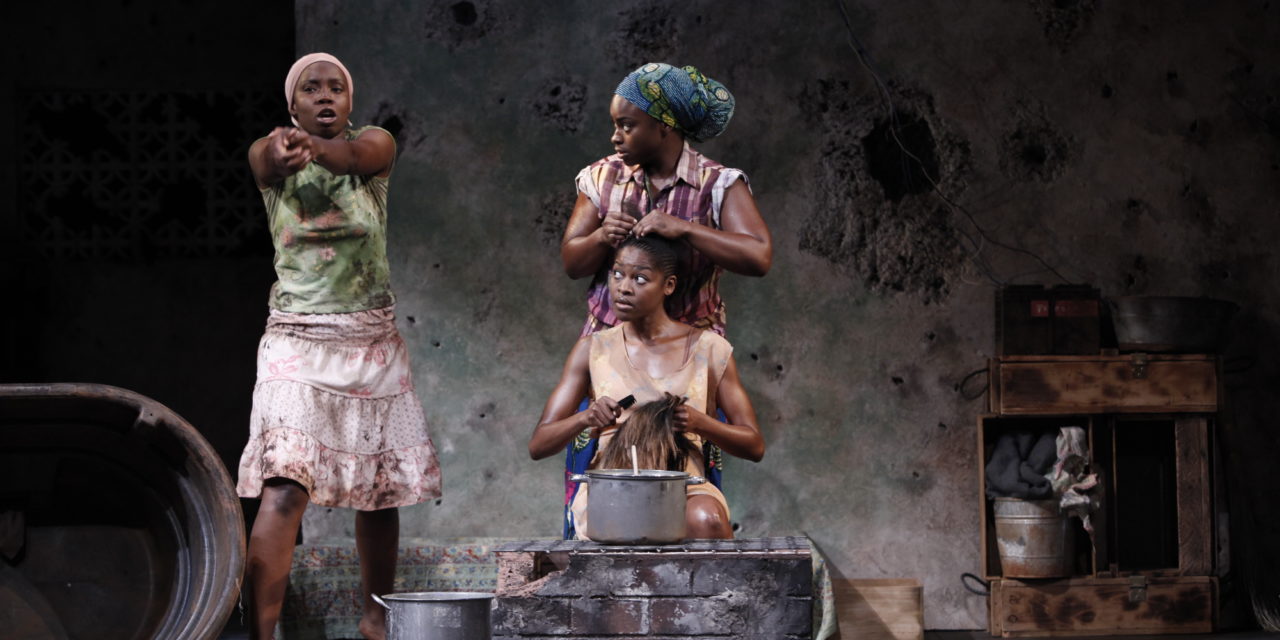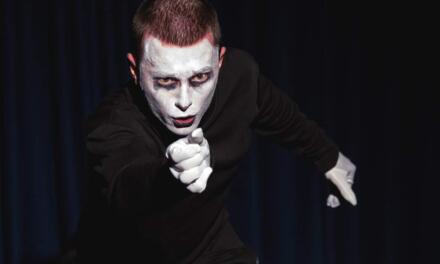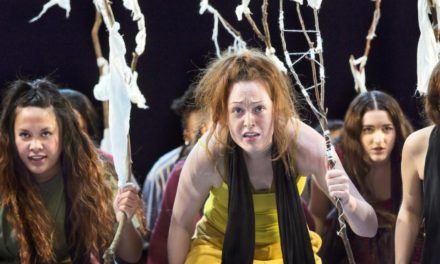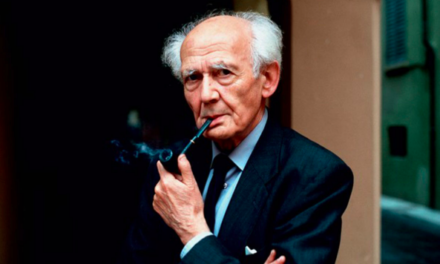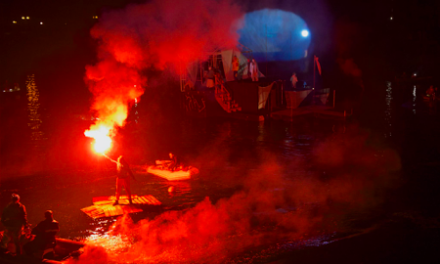They were all standing there beautifully, very funkily clad, in jeans and their shoulders and very steely glares as they looked into the camera. I honestly had never seen such an image in my life; feminine, glamorous, intimidating, powerful, belligerent, and African. I became completely enthralled. What stories rested behind those eyes. I knew at that moment, I had to endeavor to find out.
(Danai Gurira, Yale Repertory Theatre’s program of Eclipsed)
Danai Gurira recalls her inspiration for Eclipsed, which was a photo published in The New York Times in 2003, of the Liberian female rebel fighters, including Black Diamond. With that image in mind, Gurira went to Liberia in 2007 and interviewed several women who survived the fourteen-year-long civil war in the few ways possible for them: as soldiers, like Black Diamond; as “Peace Women,” promoting peace and civic education; or as military “wives,” who were really sex slaves and housekeepers. Eclipsed depicts the fictional lives of five Liberian women near the end of the war and through the resignation of the tyrant President Charles Taylor and the peace agreement among warring parties in August 2003.
Ms. Gurira’s journey has taken her from New York City to Liberia to New Haven and back again, with many stops in between. What I believe she has done is to humanize the suffering of women by showing them triumphing over their circumstances by fighting, directing, and determining the outcome of their country’s civil war. Six years since its premiere, the play is just as relevant now as its basis in factual experience and its implications for understanding current cultural conditions for women caught in conflict zones. Last year (2014) in Nigeria, for instance, the terrorist group Boko Haram kidnapped nearly 300 schoolgirls. According to reports, they are being used as sex slaves. During a recent Nigerian Army rescue of over 300 women and girls – not the same individuals – it was revealed that the abductees were being used as sex slaves and soldiers. Despite collective effort by the U.N. and Human Rights Organizations to address and resolve gender-based human rights violations in African countries – with specific activities such as Truth Commission hearings, for example – establishing safety and justice for women in post-conflict societies still faces numerous difficulties.
This season, Eclipsed opened at the Public Theater in New York City on September 29, 2015, under the direction of Liesl Tommy (Ruined, The Piano Lesson), with a cast including Academy Award winner Lupita Nyong’o (12 Years a Slave). On October 20, it was announced that the production will move to Broadway, opening at the Golden Theater in February 2016. The prospect of Eclipsed meeting a larger demographic of patrons in New York enhances the timeliness of evaluating the play’s significance in feminism and activism. Its Broadway-bound prominence, along with the star power of Ms. Nyong’o, projects to bring the drama and issues depicted in the play to a broader consciousness.In 2009, as an M.F.A. student in the Department of Dramaturgy and Dramatic Criticism at Yale School of Drama, I served as production dramaturg for this play when it premiered at the Yale Repertory Theatre. As
In 2009, as an M.F.A. student in the Department of Dramaturgy and Dramatic Criticism at Yale School of Drama, I served as production dramaturg for this play when it premiered at the Yale Repertory Theatre. As dramaturg, my primary task was to provide context for the actresses to use in preparing for their roles. In addition, I needed to find a way to help prepare an American audience to view female combat soldiers, peace activists and multiple sex slave “wives” of the same man sharing one stage in one story at the same time. Numerous challenges lay ahead. During the last phase of the Liberian Civil War in 2003, I was in my native country, South Korea, serving as an Intelligence Officer in the Navy. Coverage of Liberia was scarce in the South Korean media, and reports of the women during that period were more infrequent, if at all present. When I entered this project at the Yale Rep, the world of this play was very foreign to me.
What made me feel even stranger was the unexpected and coincidental similarity in the gender and ethnic configuration between the play and the rehearsal room: the play had only female characters, and the only male in the play, the Commanding Officer (CO), was an offstage character. The director, the playwright, the cast, and even the two stage managers were all female, and I, the dramaturg, was the only male in the rehearsal room. I could not bypass the question of ethnicity, either. There was a play set in Liberia, by an American playwright born to Zimbabwean parents, with a director from Cape Town, South Africa, and actors who were respectively from, or grew up in, The Republic of Haiti, Sierra Leone, and Nigeria. I became more conscious of my Korean nationality and more alert to the question, “How could I, as a male dramaturg from South Korea, help the play come to life?”
Allowing the broadest application of the term “feminism,” the play Eclipsed is feminist in that it gives voice to women whose stories have not been properly told. The voice and even the presence of these Liberian women had been oppressed by both the male, as the perpetrators of the war, for the duration of, and even after, the fourteen-year-long war, and the media that predominantly reported on the war-front. In bringing the story of the women in war-zones to the center, Eclipsed demonstrates a kind of dramatizing that has become more prevalent in contemporary playwriting particularly by female writers, as Sharon Friedman recognizes.2 This practice, according to Friedman, proposes to “make visible women’s war stories: the militarization of women and “femininity” in support of the war effort, the dangers confronted by women in areas where there is little distinction between militarized and nonmilitarized zones, and the sexualized dynamics of armed conflict in which women’s bodies become weapons of war.” In addition, it aims to “foreground ideologies of gender inscribed on bodies and transformed into brutal practices in communities engaged in violent conflict, as well as in the structure and culture of the military and its protocol.”
Eclipsed is feminist not only for its approach to the topic and the scholarly implication of the topic but also for its contribution to race and gender parity in the American theatre scene. The playwright, director, and cast, broadly, share the gender and ethnicity of the characters as African(-American) women. This affinity gives them more “substantive knowledge of cultural specifics” for the realistic representation of the characters.4 Actress Zainab Jah, who portrays the soldier Maima, once expressed her joy at sharing the stage with young fellow Africa-American actresses, with whom she usually competes for the same role. With its upcoming opening in Broadway, Eclipsed becomes only the second play written by woman on Broadway this season, joining Therèse Raquin, adapted by British playwright Helen Edmundson from Emile Zola’s novel, and the only one written by an African-American woman. This triumph by Ms. Gurira is a feat that even Lynn Nottage’s Pulitzer Prize-winning Ruined has not achieved.5 Liesl Tommy will join an even more rare group of female directors of color to direct on Broadway.
The play begins in a dilapidated rebel camp, where “wife” “Number One” and the pregnant “Number Three” had just hidden “Girl,” who escaped from the soldiers. These wives are numbered based on the length of time they spent with their master, the Commanding Officer, whom they address as “CO.” Their roles are reduced to those of housekeeper, cook, and sex- slave. When the CO returns from battle, he lines up his wives and calls one of them in order to rape her. The chosen wife leaves the stage, and, after several moments, returns and washes herself with a towel. This rape happens several times during the play. For wives “Number One” and “Number Three,” the rape is a routine that they have grown to be nonchalant about. They are at least guaranteed life, food, and shelter under the protection of the CO. Moreover, they have the luxury to find pleasure from the Girl’s description of the movie Coming to America, her reading of Bill Clinton’s biography, or from music on the radio. In the battlefield outside, the life of a young woman, like the Girl, is prone to gang rape and death. Still for the Girl who becomes wife “Number Four,” the rape is devastating violence.
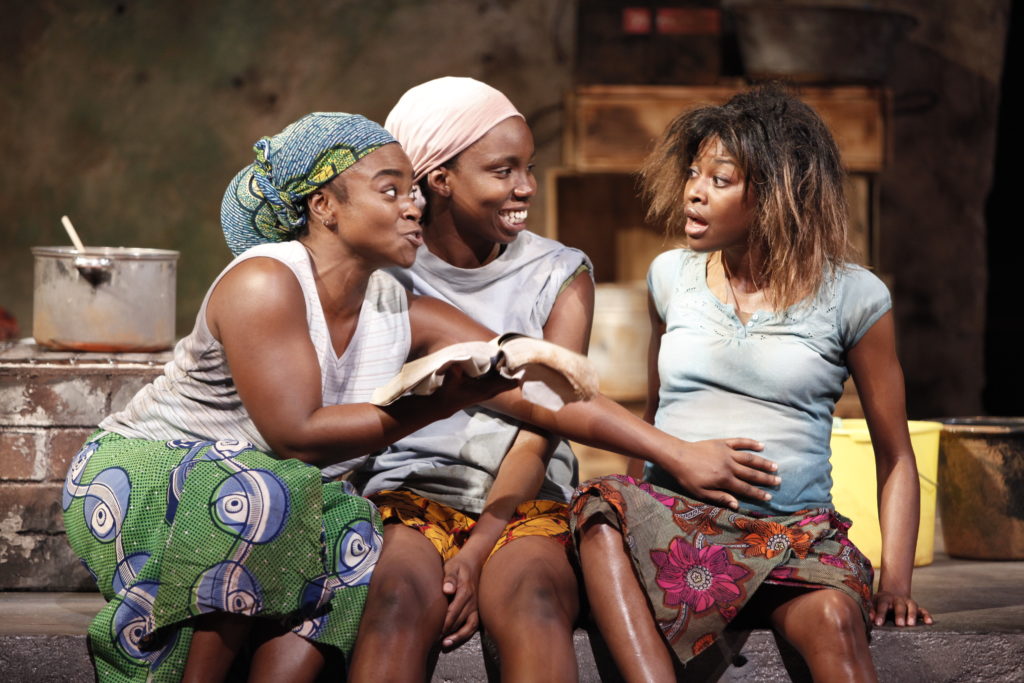
Stacey Sergeant, Adepero Oduye, and Pascale Armand in Yale Rep’s Eclipsed. Photography Credit: Carol Rosegg
While the play’s depiction of the characters is founded on realism, it enhances its focus on the women’s experience by deliberately placing the CO offstage. The CO never speaks a word or shows his face. Yet his absence and silence not only magnifies the terror of his deed but also turns him into an emotionless force rather than a human being. Silent and body-less, the CO is an overarching, oppressive presence, for whom the rape is merely a physical release. His scant human side is shown through his gifts to his wives, such as wigs, dresses, and ornaments that he plundered from civilians. Because of my gender and my own military experience, I was identified with the character of the CO at the beginning of the rehearsal, and was often asked questions like, “Why are men like that?” Even as a man who had served in the military, I could only provide my guesses. “If you fight a war for fourteen years, you just don’t know what you’re going to turn into,” I had to tell them. Though the CO was not a character that developed onstage through the play, he was real to the women in the play, and he needed to be treated as such.
In addition to the wives, who found a way to survive by serving the CO, the play introduces Maima, who was formerly wife “Number Two,” but is now turned soldier, and Rita, a peace woman. The lives of these women entangle, as Maima recruits the Girl, and Rita searches for her lost daughter in the midst of protesting for peace. Meanwhile, the rebel forces gain more power over Charles Taylor’s army, and the pressure for peace, both by the peace women and international organizations, increases. In the respective survival methods the women either chose or were forced to take under the circumstances, gender becomes a clear manifestation of their roles. They either choose the conventional notion of the feminine in a patriarchal society by becoming a “wife,”; completely strip away their femininity and assume the masculine by becoming a soldier, or turn their femininity in peaceful action as a peace woman. The male, in turn, is represented by the CO, who regards his wives merely as property and sex objects. The feminist dimension of this play is illuminated in how the women survive within the limited and forced gender categories generated in this historical situation.
The play depicts a specific moment in Liberia, and the characters are based on real people that the playwright Gurira interviewed. Yet the world that Gurira created is more than a portrait of the last couple of months before the end of the war. It is an imaginative and dramatic account, reflecting the Liberian culture and sentiment that have been formed through the country’s long and complicated history. Getting in touch with the experience of the women in the play requires an understanding of Liberia’s politics, history, and culture. It is crucial to understand that the characters were living in a country that was related to America from its origin: Liberia was founded by freeborn African-Americans and freed US slaves in 1847, with the name meaning “land of liberty.” The women in the play were torn and shattered by the long war, but they still lived with the awareness of their origin: the long bond with America and the longing for freedom. Through Bill Clinton’s biography, which the literate Girl reads to the other wives, the women learn about America’s monogamy and marriage based on love as well as the democratic government’s functioning body of Congress and Senate. Their own strict hierarchy is gradually challenged from the inside, as they begin to question their values.
The dramaturgy packet that I distributed during table work included a wide array of information, including a glossary, Liberia’s history and maps, excerpts from Gurira’s journal in Liberia, and news articles pertaining to the play’s events. Yet bringing these characters to life required more than knowledge. We needed to see how these characters would speak, think, and act. As a stranger to Liberia myself, how could I have answered when actress Adepero Oduye asked if there was a Liberian etiquette of receiving food from an elder, like in her native Nigeria? Viewing filmed images of the way Liberians lived became a crucial course of our education during rehearsal. We devoted one day of rehearsal to watching two documentaries about the Liberian civil war, Liberia: an Un-Civil War (2005) and Pray the Devil Back to Hell (2008). By hearing the voices of the women who lost everything in the war and were hanging onto their lives by the minute, we could feel the devastation and despair. On the other hand, interview footage of Leymah Gbowee, of the Women in Peacebuilding Network (WIPNET) showed us how strong and heroic a woman could be in the midst of unimaginable conflict. Her face and voice revealed her determination for peace on any account, and her leadership put pressure on the warring sections. The most striking sequence in the documentaries was that of Black Diamond slapping and chastising a white male soldier twice her size. “Firm your jaw,” she said, as she slapped him constantly, fixing him with her eyes and blocking his resistance with her other hand. She was fierce and fearless, yet calm and in control. These images turned out to be strong inspirations for the actresses, who committed themselves to understanding and portraying the women as they lived and suffered during the war.
Exploring the depth and breadth of the world of Eclipsed and enriching the production with the creative team was a process that lasted throughout the five weeks of rehearsal. Yet educating the audience (who would only come to see the final product) was a different matter. I could only assume that the patrons would be as unfamiliar with the women during Liberia’s civil war as I was prior to rehearsal. My program notes were to serve as an invitation to the audience to the world of the play. Nevertheless, as of 2009 at the play’s Yale Rep premiere (and even as of 2015), the issues evoked in the play – human rights, especially women’s rights, reparations for war victims, and bringing the war’s perpetrators to justice – were not, and are still not, fully resolved. While the characters’ lives on stage end with the announcement of the peace agreement, the lives of the actual women who were the inspiration for these characters are still continuing. For the historical continuity, the play’s feminism carries the call for activism. For this reason, I envisioned the program to be a guide that would not only inform but also take the audience experience beyond the human drama and toward a higher political, cultural, and historical awareness.
The play presents two months of the women’s lives right before the end of the Liberian civil war. For these women, these two months carry the historical significance of a transition, from war to peace, from oppression to freedom, and from limited choices to an open-ended life ahead. In providing a comprehensive guide to try to access the lives of these women on stage, I focused on the notion of historical landscape and the inhabitants of this landscape. I asked “What historical landscape lies before and beyond the two months depicted in the play?” and “Where can we locate these characters in terms of the women in Liberia’s history?”
I wrote seven articles for the program, starting with “Liberia: Tailoring (Then ‘Taylor’ing) an African Democracy,” a history of Liberia from its origin in 1821 to the 2005 election of Ellen Johnson Sirleaf, the first female head of state in Africa. The second article, “Betsy Ross * 7: A Flag For Liberia,” was about the women who designed and hand-stitched the Liberian flag in 1847, and the symbolic meaning of the flag. The third article, “Liberian Women and Marriage,” described the native practice of polygyny and revealed how the number of a man’s wives measured his status and fortune, especially during the civil war, and how women were treated as war trophies and forced into sexual slavery. On Gurira’s request, I highlighted the sentence; “The UN estimated that approximately 70% of Liberian women had been the victims of sexual violence during the wars.” “Liberian Women-At-Arms” introduced how women became soldiers and established themselves as a force to reckon with against Charles Taylor’s government army: “At one point, women made up 35% of the Liberian Civil War military forces.” Next, in “Path to Peace,” I covered the topic of “Peace Women,” and their actual role in ending the war. I highlighted, “As the conflict between the government army and the rebel forces escalated in 2003, over 1,000 women from various organizations . . . dressed in white, occupied streets, markets, and government buildings”: “Their public plea led to formal peace talks between the Liberian government and the opposing parties in Accra, Ghana, in June 2003.” In “War and Peace: Liberia from 1979 to 2003,” I provided a timeline, starting from the “Rice Riot” that instigated the military coup in 1979 to the end of the civil war, tracing, in more details, the steps leading to the peace agreement. For the audience’s better understanding of the language, I added “A Small Small Note on Dialect,” where I explained the unique characteristics of Liberian English: sometimes, an “oh” sound is added to the ends of words or sentences, “I think she a witch oh”; and a word might be repeated for emphasis, as in the phrase “I was small small.”
In order to inform the patrons of ways to get involved with a helping effort, we printed links to organizations that are “continuing to promote peace in Liberia and further women’s rights around the globe,” including The United Nations Mission In Liberia (http://unmil.unmissions.org), The United Nations Entity for Gender Equality and the Empowerment of Women (unwomen.org), The Women’s International League for Peace and Freedom (peacewomen.org), Pray the Devil Back to Hell (praythedevilbacktohell.com), Friends of Liberia (fol.org), and Peace is Loud (peaceisloud.org). In providing links to these organizations, the theatre and I faced one concern: How much should the Yale Rep, as a regional theatre, engage with the issues depicted in the play? How much responsibility comes with learning about these issues? We considered providing brochures from these organizations for patrons to take home. However, we did not proceed with that. Neither the play nor the production asks anyone to take direct action. They simply present the lives of these five women caught in the transition from civil war to the next stage. We shared our hope that the impact of the production would go beyond the theatre and believed that the contextual information about the play and names of organizations would harness the audience’s compassion to make their own efforts for the peace movement.
The Yale Rep production of Eclipsed was very well received. The New York Times gave it a rave review, and it won the Connecticut Critics Circle Award for Outstanding Production of a Play. In terms of the American theatrical landscape, this production added to the list of productions that same year by African-American female playwrights, joining Lynn Nottage’s Ruined (The Goodman Theatre / Manhattan Theatre Club) and Tracy Scott Wilson’s The Good Negro (The Public Theatre). In New Haven, in special educational discussions, Eclipsed raised awareness of a post-colonial African country and the plight of the women there. At pre- and post-show conversations, patrons asked about the current state of these kinds of women in Liberia; a few shared their own similar experiences, and several expressed hope that this play would reach wider demographics.
Since the end of Liberia’s civil war, Liberia has gradually regained political and economic stability, especially under the leadership of President Ellen Johnson Sirleaf, who got reelected in 2011. In April 2012, the Special Court found Charles Taylor guilty of charges including terror, murder, and rape and sentenced him to 50 years in prison. The effort for peace by the Liberian women has continued and even spread internationally. In 2011, Ellen Johnson Sirleaf and Leymah Gbowee were two of the three awardees, along with Tawakkol Karman of Yemen, of the Nobel Peace Prize, in recognition of their “nonviolent role in promoting peace, democracy, and gender equality.”7 In May of 2015, Gbowee, along with Gloria Steinem, in a group of 30 female peace activists, marched from North Korea to South Korea, calling for peace and reunification between the divided Koreas.
Despite the gradual healing effects since the civil war ended, however, Liberia still faces numerous challenges, both as the aftermath of the war and new problems such as the recent Ebola outbreak. While the question of reparations for war victims still remains unresolved, more troubling situations have developed which reflect ongoing, and perhaps even more widespread exploitation. Recent news reports have revealed that some members of the United Nations peacekeeping forces have sexually abused women and children in the form of “transactional sexual relationship,” which is the trading of favors for sex, in countries including Liberia, Haiti, the Democratic Republic of Congo, and Sudan. While female leaders such as Ellen Johnson Sirleaf and Leymah Gbowee have tremendous contributions to not only Liberia’s well-being but also women’s rights internationally, countries without a proper system to protect women still suffer.
One might ask, “what can a play or a theatre production do to solve a country’s problems, ones that are so deeply ingrained and widespread as the aftermath of war?” The actual contribution might be on the level of bringing light to the problems as a global issue. The dramaturg’s role can be to inform the patrons of the specificity of the problems and thus help make the helping effort more accessible and effective. In the current world of globalization and high technology, one country’s problem is no longer just its own. Reflecting on my initial challenges as an outsider to the depicted world of Eclipsed, I realize that lending artistic content to a play depicting a different culture is a challenge that more and more theatre artists will face as international collaborations grow in number. While I, as a South Korean male, did not have direct access to the experience of the women in Eclipsed, navigating my place as an outsider helped me build a more solid connection between the production and the outside world. Seeing the potential humanitarian impact of the production confirmed my aspiration that the dramaturg’s contribution reaches beyond the rehearsal room and continues after the closing of the production. While learning about Liberia and these phenomenal women, I realized that I had stepped into the shoes of someone with a different gender and nationality. The cast members identified me as the CO in the beginning of rehearsal, but by the end, they gave me the nickname, “Wife Number Six.” I suppose this meant I was integrated as part of the cast family. An outsider to the depicted world, I was, nevertheless, a necessary supporter and commentator who sought to help bring the story of these women to life on stage.
The production at the Public Theatre has already received a rave review from the New York Times and continuous standing ovations from patrons. But more importantly, the play is gathering critical attention from prominent personalities who are committed to philanthropy. Oprah Winfrey, Stevie Wonder, the rapper Common, Chris Rock, and UN Rep, Zainab Bangura, Special Representative of the Secretary General of Sexual Violence in Conflict are only a few philanthropists who attended Eclipsed so far. The play’s Broadway run next year will bring even more attention to the story of this play and the recent history of women in Liberia. I have been privileged to play my part in this effort. My hope is that the play will continue to harness the audience’s compassion and lead them toward positive action in our global environment.
This play is my humble attempt to give voice to women who navigate these vicious terrains not of their making. To give their stories, their personhoods, their eclipsed light a full – though fleeting – chance to shine.
(Danai Gurira, Yale Repertory Theatre’s program of Eclipsed)
The original version of this article, “Intercultural Dramaturgy: Dramaturg as Cultural Liaison,” was published in The Routledge Companion to Dramaturgy. Reposted with permission. The current extended version was presented as part of the panel “Reclaiming the ‘F’ Word: Historical and Contemporary Feminist Performance as Theatrical Activism” at the ASTR (American Society for Theatre Research) Conference in 2015.
Footnotes:
4. Kathy A. Perkins and Sandra L. Richards, “Black Women Playwrights in American Theatre.” Theatre Journal, Volume 62, Number 4 (December 2010): 541-545.
5. Michael Paulson, “Lupita Nyong’o Coming to Broadway in ‘Eclipsed’,” The New York Times, October 20, 2015.
This post was written by the author in their personal capacity.The opinions expressed in this article are the author’s own and do not reflect the view of The Theatre Times, their staff or collaborators.
This post was written by Walter Byongsok Chon.
The views expressed here belong to the author and do not necessarily reflect our views and opinions.

